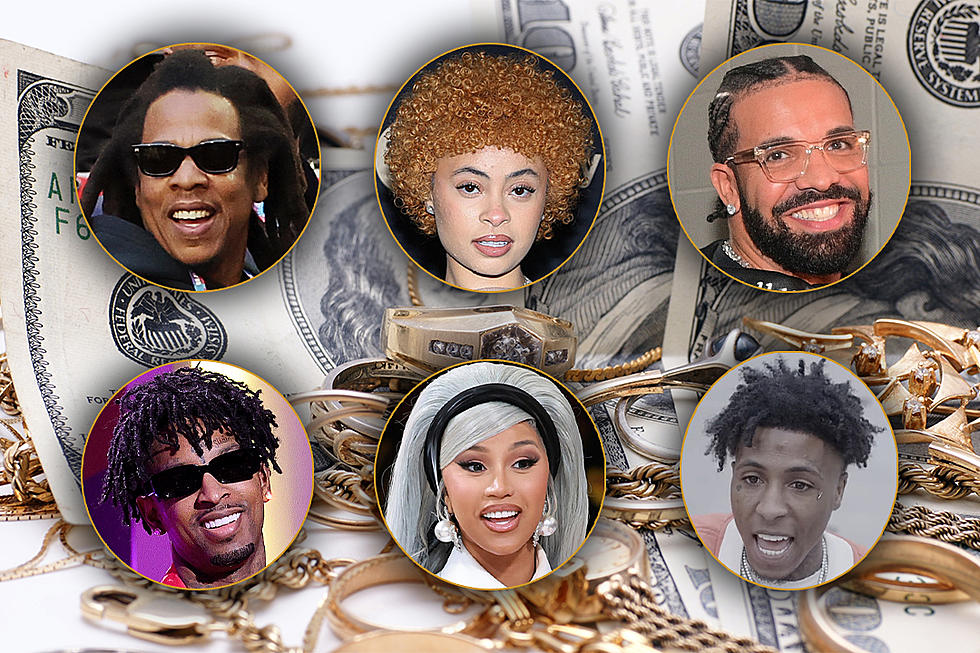
TNGHT: Hip-Hop Meets Electronic Dance And It’s Explosive
In between Coachella appearances, the production tag team known as TNGHT rolled through New York City last Wednesday to perform a show that’s as close to the festival experience as you can get. Lunice, who stepped away from the DJ booth to turn up with shots of vodka, commanded the audience with the prowess of an orchestra conductor. Hudson Mohawke dropped punishing hits, and the duo’s live set was loaded with energy. The capacity crowd at Webster Hall embraced the mayhem, responding with delight to the skillful transitions from “Higher Learning” to “Panera Bread.”
TNGHT hails from outside of the American music scene (Lunice is from Montreal, while HudMo calls Glasgow home), but they’ve impacted both hip-hop and the States’ EDM revolution with a unique sonic fusion of the two genres. Their production has attracted an array of rappers – from Lil Wayne to Future – and has left room for the imagination. In anticipation of their forthcoming summer tour, XXL sat down with TNGHT before their NYC show to discuss their rise, their hip-hop influences and future plans.—Eric Diep (@E_Diep)
You guys aren’t originally from the States. How does it feel to be getting embraced by so many big artists here?
Lunice: America has always been the main influence, in terms of music media, to the world. On my side, I’m that guy from Montreal being influenced by American media and expressing it how I see it. For us to be in a situation where people would see us as blowing up in the States, I can only be grateful about it. It was never our goal to blow up in the States. It’s just a really amazing look to see the positive response in the States about. It’s a completely different perspective compared to an artist born and raised in the States and building up from there. We’re just really glad that it’s starting to bridge more than it used to.
Hudson Mohawke: I still feel like we haven’t even blown up around here.
Lunice: We’re just starting. It literally feels like we’re just starting.
What about you, HudMo? You come from Scotland. How do you feel about how Americans have taken to the music?
HM: It’s pretty good. Both of us having been doing our own individual stuff for quite awhile now, so we’ve been touring our own solo stuff for like five, six years now already. So this is definitely fun. A fun side project to experiment with for a while. Even though this is our first exposure to this new audience, we’ve sort of been around doing this for quite a few years now.
L: Basically, what I like about the project… it’s not a duo, it’s not a band. Because of that we’re not dependent on each other. We’re not dependent on getting the next big track as TNGHT. We’re just creating together and then we go about our own ways creating. ‘Cause he’s coming out with an album. I’m coming out with a full length album as well. That’s what I love about it and people are aware of that. That’s what’s good. I’m glad we’re starting to establish that we’re both individual artists coming together to present a project. That’s what a lot of people sort of overlook.
What are the hip hop influences in your music?
HM: All of our solo material has been influenced by more mainstream hip-hop stuff. But it has always been in the more experimental side of things. So this was like, “We might as well do some simple, straight-up hard hits.” Just to prove a point. This is kind of what a lot of our music is based on but it’s not the sort of be-all, end-all of us as artists.
L: Exactly, ‘cause we’re all hip-hop heads like he said. We all listen to Big L. We all listen to Lord Finesse. We all listen to that and that’s how it’s always been since I can remember and that’s how it has always been with him too. What’s interesting about it is in the same way Afrika Bambaataa wanted to push rap music, how he wanted to move it forward, we’re in the same kind of mentality. We wanna push it forward. We admire rap music. We admire the hip-hop culture. We were born and raised in it. So we wanna contribute to it with something new. In the ways of our forefathers or whatever, pushing hip-hop to the forefront, type of deal. Rather than trying to be part of a group in the sub-culture of rap music, we wanna prove a point. The point being we want to move it forward. Something interesting, something new, something fresh. That’s how it’s always been really.
You have two different production styles. Can you name some of your early production influences?
HM: My early influences I guess was more electronic stuff. I guess Boards of Canada stuff like that used to be big European electronic stuff. They were pushing the boundaries in terms of electronic sounds, but I never made music in that style. I want to incorporate elements from that and make it our own. So that’s when I started applying it to a hip-hop palette. I used to be a battle DJ as well. So then I started to combine the two things with a more intricate production style. Applying it to what I was listening to at the time, which was golden era hip-hop, Big L, all the type of stuff that I used to be really into when I was in high school. So it was just trying to bring the two worlds together.
L: On my side, it’s sort of similar, but I guess the reverse. Starting in the hip-hop culture, breakdancing, beatboxing and getting into production, I started to make really sample-based type beats and my main early influence was 9th Wonder. So at the time, I was making a lot of jazz influenced type samples. I eventually got to a point where I was like, “I wanna try to make something you can play at a club that isn’t Lil’ Jon.” Because at the time, Lil Jon was making so much—everything was a Lil Jon track. So I was like, “Yo, I want something poppin’ like that but I don’t wanna be about it.” I was always that kind of guy.
Even in the breakdancing scene. I was like, “I wanna be a B-boy but I don’t want to be a B-boy, per say.” So that’s when I came across electronic music. The reason why I liked it was because the whole thing about electronic music is that there’s a huge freedom in it. You can literally do what you want, how you want and it still be in the context of it being electronic music. So that really intrigued me and enabled me to push without worrying about anything. Without worrying that, “Oh I should maybe sound a little grittier and hood or something, just to sound like Lil Jon.” And then to sell it to a rapper and be like, “Check out my Lil Jon beat.” I wanted to just make something my own and electronic music, or the scene of it, presented itself as something I could totally get into and create and push what I wanted to do. And that’s how I came across Rustie, HudMo and all the guys in LuckyMe.
You guys have attracted a lot of rappers. Lunice, you’ve been on some tracks with Rockie Fresh. Why do you guys work so well?
Lunice: What I love about him, and I can say the same thing for Casey Veggies and a lot of other homies like that, is they’re in the same context in terms of how they see rap music and how they see it in the next five years. You know what I mean? There’s a whole thing about thinking about it now. But you got to also think about how it goes, longevity wise and how you want to present it. Everything that Rockie Fresh thinks of, he makes sure that it’s timeless.
Same with my own production. Some of my stuff may not come off as timeless but I’ve always had that idea of making sure it can last. Looking back and being like, “Oh, this was great.” I wasn’t a part of no trend, no bandwagon. It was just literally that moment of me making that song and that’s what happened. That’s what I love about it. He understands that. The same way Casey does. The same way Angel Haze does. Those type of people and what’s funny is they’re all our ages. The new generation. And in the same way how the Ruff Ryders were in their generation and the same way with the Wu-Tang too and all those guys from those generations starting their own things. That’s what’s happening with us.
Pusha T was saying My Name Is My Name is like three different albums—Life After Death, Harlem World and The Purple Tape--in one. HudMo, where do you fit in those categories since you contributed to the album?
HM: I haven’t heard the whole thing yet. I heard what he had as an album six months ago, but I’m sure things have changed since then. But I think I brought two or three, something like that. I’m just bringing my thing to this record. I wasn’t trying to fit it in any sort of aesthetic for the record. When I gave him those beats, I hadn’t really heard the rest of the record. So I’m just giving him my thing.
On I Am Not A Human Being II, Lil Wayne and Nicki Minaj were on one of your beats. What did you think of it?
L: We’re pretty happy, man.
HM: They had the beat before we even put it on our record, ‘cause it came out on our instrumental record as well. And we didn’t think they were going to use it. They had it but obviously it’s a situation where they were gonna take 1000 beats and whatever ends up on the record, it is. So I was kind of surprised. We found out two weeks before it came out that it was going to be on the record. It was a nice surprise.
Are you focusing on solo work or a TNGHT album at the moment?
HM: I think it would be too easy to focus totally on this stuff just because it’s half in the moment. Our solo stuff is all about us as musicians and TNGHT’s stuff is an experiment and its all fun and everything but it’s not all encompassing us as artists.
Lunice: It’s an experiment.
HM: There are definitely going to be more releases and everything. In terms of the solo stuff we gotta make sure that gets its airtime as well.
L: Our solo stuff is what makes TNGHT. It’s not TNGHT that makes TNGHT. It’s when we both are separated, working on our own things, getting into our own world individually and then after that, we get back together, catch up and then work. That’s how TNGHT came about. It doesn’t come about by us sitting in the studio thinking, “What’s the next TNGHT track?” Nah. It comes about us in the studio after months and weeks of touring on our own. And then coming back, catching up on a few things, maybe having a few drinks and then being like, “Yo, let’s do this shit right now.” And then we start something up. And then that’s what happens and then it becomes the track.
Have you guys taken any trips to Paris yet this year?
HM: We just try to not talk about that stuff.
L: Everybody wants to know about that shit.
So what’s next?
HM: Going to Paris next week. [laughs]
More From XXL









